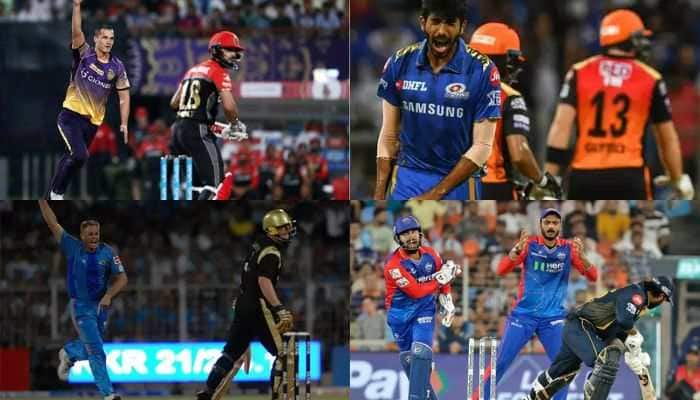Regional leaders have gained bargaining power
Assembly poll results can lead to stirring the pot in politics during the next 3 yrs.
Trending Photos
)
 HK Dua
The Assembly elections in West Bengal, Assam, Tamil Nadu and Kerala can lead to stirring the pot in Indian politics during the next three years.
Taking into account the Bihar elections a few months ago and the prospect of Assembly elections in Uttar Pradesh, the developing situation is bound to have an impact on the next Lok Sabha elections in 2014.
There is a distinct possibility of new permutations and combinations shaping the pre-poll politics during the next three years keeping the spot news panels busy.
These permutations and combinations will essentially involve the two national parties – the Congress and the Bharatiya Janata Party, as well as the regional parties that have to come to govern major States of UP, Bihar, West Bengal and Tamil Nadu.
Alliances will be in the news in which Mamata Banerjee, Jayalalithaa, and Mayawati as well as Bihar Chief Minister Nitish Kumar can play major roles before and after the 2014 Lok Sabha elections. While the recent Assembly elections have seen practically single-party governments emerged in West Bengal, Assam and Tamil Nadu, at the Centre the coalition governments have been ruling for nearly 13 years. The NDA ruled over six years and the UPA led by Dr Manmohan Singh and Sonia Gandhi have completed seven years by now in office.
Taking into account the present political landscape it is clear that on their own the national parties will not be in a position to form governments at the Centre in 2014.
Whether they like it or not, they will have to form coalitions to come to power. This means that the regional parties will have considerable bargaining power in the evolving situation in which Mamata, Mayawati and Jayalalithaa and Nitish Kumar are bound to play a major role in the formation of the new government.
In the political bargaining that the next three years may witness, the Congress party will be better placed than the BJP.
This is mainly because the Congress party is leading the UPA government for the last seven years by now and has been able to win Assam and Kerala and is partner of the Trinamool Congress in West Bengal.
The BJP’s performance in the recent Assembly elections has been appalling. For reasons known to its leadership it chose to put up as many as 800 candidates out of which only six have been elected. This kind of performance in the elections will deter other parties from joining the BJP for the Lok Sabha elections. This is particularly so when the party has no leader like Atal Behari Vajpayee at the helm to form an NDA and run a coalition smoothly and in a consensual style he came to adopt to run the government for over six years.
And the way politics is shaping in the States, the Congress will have to choose its regional allies with care. This is particularly so in view of the 2G scam in which the DMK, former Telecom Minister Raja and Karunanidh’s daughter Kanimozhi are involved. Also is the DMK’s and Karunanidhi family’s rout in Tamil Nadu.
The re-emergence of Jayalalithaa in Tamil Nadu with a massive mandate places her at an advantage in dealing with the Congress. The telephone call which Sonia Gandhi made to Jayalalithaa could have been more than a mere post-victory greetings.
Of interest will be how the Congress party’s equation with Mamata Banerjee takes shape during the next three years before the Lok Sabha polls.
Didi has had a massive mandate at the polls recording a victory that uprooted the Left Front Government after 34 years of misgovernance. She has been mercurial and temperamental in style which was warranted when she was fighting single-handedly in her fight against the CPM, but can be a liability when in office.
Power, however, often makes a yesterday’s street fighter into a sober ruler. A massive mandate also throws a massive responsibility on Mamata’s shoulders, which in turn can make her a responsible Chief Minister.
In any case, she has inherited one of the most ill-governed States of the country, thanks to the long-rule of the CPM and its docile allies. She would require more money from the Centre to clear the debts the CPM rule has left behind.
The dependence on the Centre and the fact that the Congress is a partner in her Government has its own logic that the TMC and the Congress can go along together towards the next Lok Sabha polls.
In any case, the UPA government is in no mood to displease Mamata who could play the same kind of a role in sustaining the Congress-led Government at the Centre as did the Left until it walked away from the UPA over the Nuclear Deal with the US two years ago.
Mamata will be less of a worry for the Congress than Prakash Karat at times of need. After all she has the Congress blood in her veins. In a way, she is the Congress party in West Bengal.
Out on the limb now is the Left which has to redesign its politics, strategy not only for the Lok Sabha polls, but also for its own future.
The Left which has been chasing the mirage of a Third Front, has become an object of sneer and pity across the country. It will take quite a while and a leadership with foresight and new ideas to make the Marxists a relevant factor in a changing India.
(The writer is a senior journalist and now a Member of Parliament.)
HK Dua
The Assembly elections in West Bengal, Assam, Tamil Nadu and Kerala can lead to stirring the pot in Indian politics during the next three years.
Taking into account the Bihar elections a few months ago and the prospect of Assembly elections in Uttar Pradesh, the developing situation is bound to have an impact on the next Lok Sabha elections in 2014.
There is a distinct possibility of new permutations and combinations shaping the pre-poll politics during the next three years keeping the spot news panels busy.
These permutations and combinations will essentially involve the two national parties – the Congress and the Bharatiya Janata Party, as well as the regional parties that have to come to govern major States of UP, Bihar, West Bengal and Tamil Nadu.
Alliances will be in the news in which Mamata Banerjee, Jayalalithaa, and Mayawati as well as Bihar Chief Minister Nitish Kumar can play major roles before and after the 2014 Lok Sabha elections. While the recent Assembly elections have seen practically single-party governments emerged in West Bengal, Assam and Tamil Nadu, at the Centre the coalition governments have been ruling for nearly 13 years. The NDA ruled over six years and the UPA led by Dr Manmohan Singh and Sonia Gandhi have completed seven years by now in office.
Taking into account the present political landscape it is clear that on their own the national parties will not be in a position to form governments at the Centre in 2014.
Whether they like it or not, they will have to form coalitions to come to power. This means that the regional parties will have considerable bargaining power in the evolving situation in which Mamata, Mayawati and Jayalalithaa and Nitish Kumar are bound to play a major role in the formation of the new government.
In the political bargaining that the next three years may witness, the Congress party will be better placed than the BJP.
This is mainly because the Congress party is leading the UPA government for the last seven years by now and has been able to win Assam and Kerala and is partner of the Trinamool Congress in West Bengal.
The BJP’s performance in the recent Assembly elections has been appalling. For reasons known to its leadership it chose to put up as many as 800 candidates out of which only six have been elected. This kind of performance in the elections will deter other parties from joining the BJP for the Lok Sabha elections. This is particularly so when the party has no leader like Atal Behari Vajpayee at the helm to form an NDA and run a coalition smoothly and in a consensual style he came to adopt to run the government for over six years.
And the way politics is shaping in the States, the Congress will have to choose its regional allies with care. This is particularly so in view of the 2G scam in which the DMK, former Telecom Minister Raja and Karunanidh’s daughter Kanimozhi are involved. Also is the DMK’s and Karunanidhi family’s rout in Tamil Nadu.
The re-emergence of Jayalalithaa in Tamil Nadu with a massive mandate places her at an advantage in dealing with the Congress. The telephone call which Sonia Gandhi made to Jayalalithaa could have been more than a mere post-victory greetings.
Of interest will be how the Congress party’s equation with Mamata Banerjee takes shape during the next three years before the Lok Sabha polls.
Didi has had a massive mandate at the polls recording a victory that uprooted the Left Front Government after 34 years of misgovernance. She has been mercurial and temperamental in style which was warranted when she was fighting single-handedly in her fight against the CPM, but can be a liability when in office.
Power, however, often makes a yesterday’s street fighter into a sober ruler. A massive mandate also throws a massive responsibility on Mamata’s shoulders, which in turn can make her a responsible Chief Minister.
In any case, she has inherited one of the most ill-governed States of the country, thanks to the long-rule of the CPM and its docile allies. She would require more money from the Centre to clear the debts the CPM rule has left behind.
The dependence on the Centre and the fact that the Congress is a partner in her Government has its own logic that the TMC and the Congress can go along together towards the next Lok Sabha polls.
In any case, the UPA government is in no mood to displease Mamata who could play the same kind of a role in sustaining the Congress-led Government at the Centre as did the Left until it walked away from the UPA over the Nuclear Deal with the US two years ago.
Mamata will be less of a worry for the Congress than Prakash Karat at times of need. After all she has the Congress blood in her veins. In a way, she is the Congress party in West Bengal.
Out on the limb now is the Left which has to redesign its politics, strategy not only for the Lok Sabha polls, but also for its own future.
The Left which has been chasing the mirage of a Third Front, has become an object of sneer and pity across the country. It will take quite a while and a leadership with foresight and new ideas to make the Marxists a relevant factor in a changing India.
(The writer is a senior journalist and now a Member of Parliament.)







)
)
)
)
)
)
)
)
)
)
